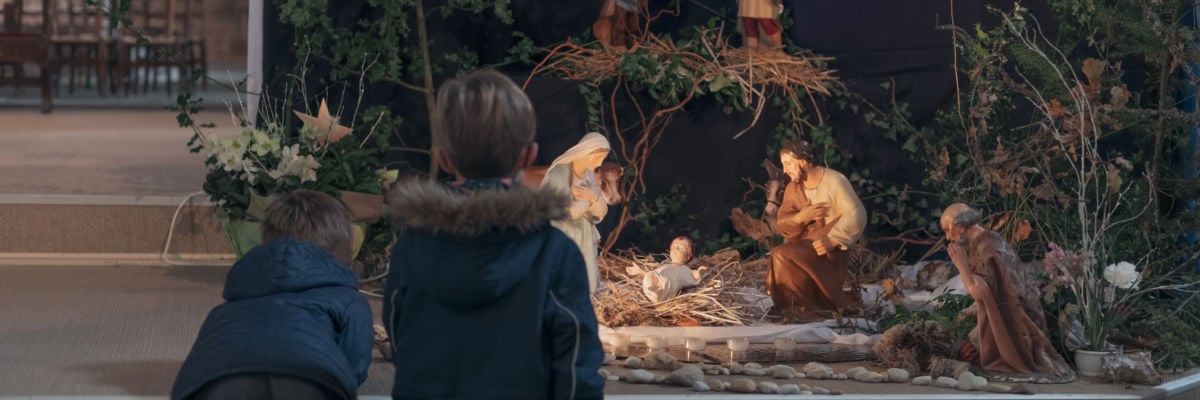
Whenever I’m asked, “What inspires you to seek out religious life?”, there are two ways to answer the question. The first is to tell my own story; the second is to tell all about religious life itself, describing the ways of life my favorite orders follow and what exactly their mission is for the Church.
I have witnessed confusion on the face of many a non-Catholic when attempting either of these answers. Why am I, a young man fresh out of college, interested in pursuing religious life? The modern world would have us abandon all mystical notions and pursue only things that will deliver us pleasure or serve some utilitarian purpose for society. How does religious life make any sense?
The elephant in the room is that I simply cannot fully explain this desire, nor should I be able to. This desire is something mystical, a grace put in my heart by God. Grace, the Church teaches, is a mystery in the highest sense. The Catechism tell us, “Since it belongs to the supernatural order, grace escapes our experience and cannot be known except by faith.” (2005). Thus, only through faith can we make sense of the desire to pursue religious life.
For those outside the Church, and especially those who do not believe in God at all, the desire to give up a life in the world and devote yourself entirely to the contemplation of God will be a perpetual source of confusion, a stumbling block. This is because religious life is first and foremost a desire to give your whole self to God, and it can be understood only as much as God is understood. All other aspects of it, such as vows, living in community, and prayer, follow from that primary desire for union with God. Understanding this, we can better understand why young people pursue religious life.
Religious life is the most perfect way of life for pursuing God. A religious gives up everything—wealth, a spouse, even his own will—so nothing may distract or inhibit this pursuit. Father Romanus Cessario, O.P. notes in his article “Thomas Aquinas and Vocational Discernment” that the three vows of poverty, chastity, and obedience, the standard vows for most religious orders, make of the religious a whole sacrifice to God by offering external goods, bodily goods, and goods of the soul. These goods are offered not out of some harsh asceticism or misguided hate of the world, but rather to more freely and fully say yes to the grace by which the religious grows closer to God.
Wealth is given up so that material things do not become a burden to be constantly looked after. In exchange for never having to worry about starving or being without a roof, we may find that protecting and maintaining our possessions become a worry. Our attachment to our possessions can make the thought of being without them a frightening thing, and so many saints have chosen instead to live without such attachments and thereby found immense freedom and relief. St. Francis of Assisi, a radical example of someone who chose poverty, grew greatly in his love for God once he had given up all the wealth of his family. His trust that God would keep him alive was rewarded.
Love between man and woman, which finds its natural fulfillment in the sacrament of marriage, demands that we dedicate a significant portion of our time and attention to our spouses in order to live happily as a couple and as a family. This is a good thing, but the religious experiences this good in an even better way. The religious, by taking a vow of celibacy, dedicates this time and attention to God and lives happily with him as the one focus in life. God provides the love that would have been provided by a spouse.
Religious orders are organized hierarchically, and the vow of obedience requires that a religious obey any command given by his superior. Many religious have found that obedience is the hardest of the vows. This is because even when they disagree with their superior, and even if they are commanded to do something that goes against their own better judgement, they are bound to obey. (This does not mean that a superior can order those under his charge to sin.) Because of the solemnity of this vow, God wills that the religious obey the commands of his superior, even when these commands seem strange. In the diary of St. Maria Faustina Kowalska, we read that once Jesus told Faustina to ask her superior for permission to wear a hair shirt. Faustina was surprised when her superior refused to grant permission, and she immediately told Jesus. We might expect Jesus to tell her to wear the shirt anyway, but instead, he commended her for obeying her superior, saying, “By obedience you give great glory to me and gain merit for yourself” (Diary 28). Through the vow of obedience, God teaches humility, makes his will known, and teaches the religious to be satisfied with following God’s will rather than his own. The vow of obedience to follow the superior’s will is a vow to follow God’s will.
This threefold sacrifice of the whole person, when kept faithfully, empties the religious of so many things that close his heart and prevent him from delighting in God’s grace.
Young people are interested in religious life not because of the difficulty of the vows, not as some challenge to overcome to test their own patience, but to satisfy the hunger for God planted in their hearts, and to delight in him. Like grace, nothing can totally explain why young people desire religious life instead of secular life, since the desire is itself a grace. Grace comes from God as a free and undeserved gift; nothing we do causes him to give it to us. But by seeing the happiness of holy monks and nuns compared to how unhappy people are living the way the secular world tells them to, we can grasp that there is a reason young people choose to accept that grace. Only something truly mystical and intangible could put such a desire in our hearts.



